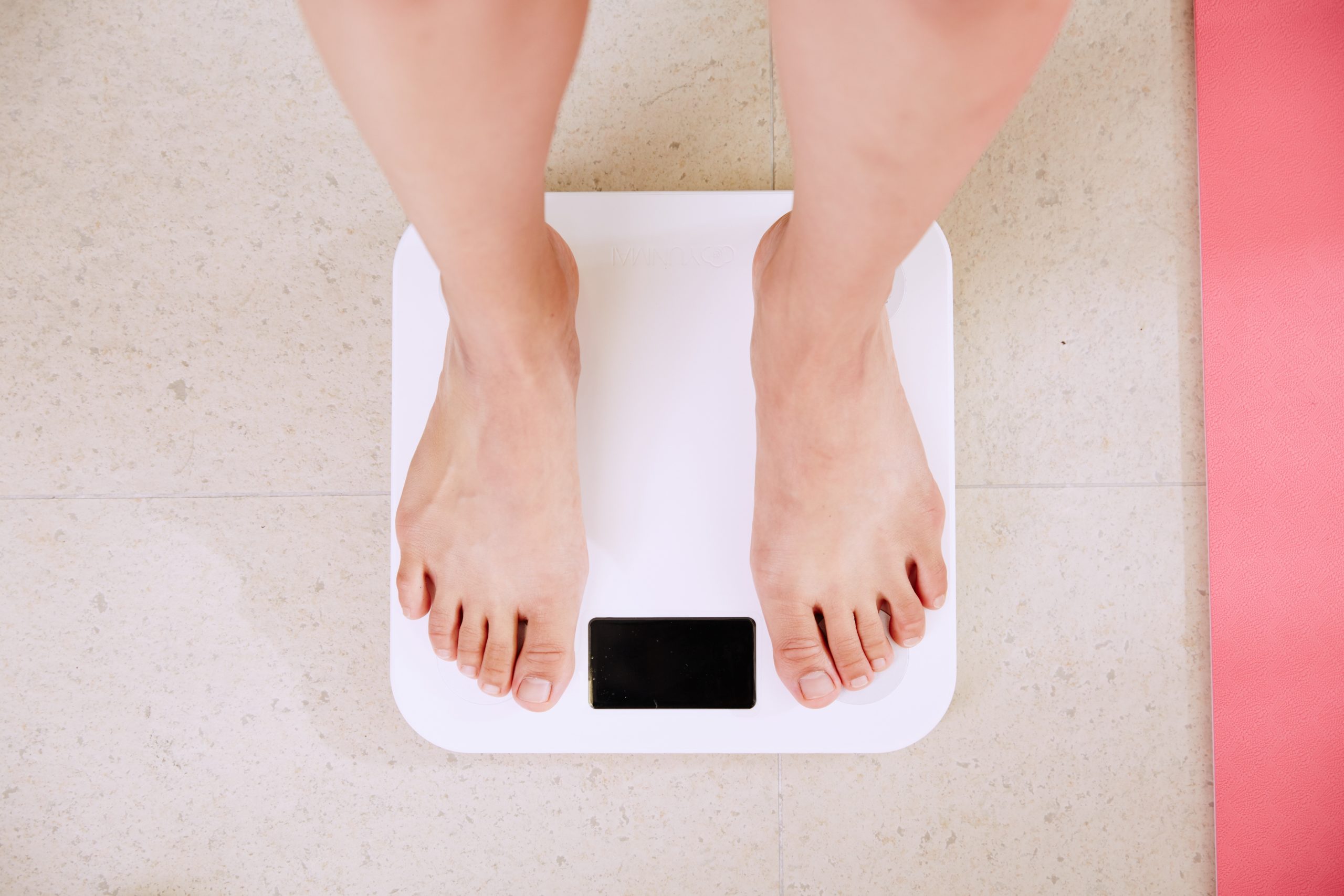Now that we’re about four months into the year, we’re hitting that time where many women start to see a big slowdown in their progress towards the weight loss goals they set in January.
If you’re staying consistent with your food and fitness choices, there may be some underlying reasons why you might be getting stuck in your weight loss journey.
And let’s face it… weight loss plateaus are downright downers.
Especially if you’re doing everything “right.” You’re exercising every day. You’re cutting calories. And the number on the scale just isn’t budging. It’s enough to make you want to give up on putting any energy into your diet or exercise routine.
However, there are several factors (both within and outside of your control) that can contribute to your inability to lose weight.
In this blog post, I’ll share with you the top five reasons why you’re not losing weight, even despite your best efforts.
Keep reading to see if any of these reasons apply to you, and learn what you can do to overcome them!
Reason #1: Overtraining
Exercise is an important piece of the puzzle when it comes to weight loss.
But too much exercise, and exercise that’s too intense, can actually stall your weight loss efforts.
Exercise is a stressor on our bodies. Most of the time that stress is good. It creates stronger muscles and can stimulate body fat reduction.
However, when that exercise moves into the category of overtraining, that extra stress can actually be what prevents us from losing weight.
Intense training causes a rise in cortisol levels. And when you’re training hard most of the week, that cortisol increase becomes chronic.
Chronically elevated cortisol can lead to leptin and insulin resistance that ultimately impairs weight loss.
Fat storage is one of our body’s favorite ways of buffering against long term stress.
The more stress we experience from overtraining, the more our bodies will respond with protective (but unwanted) fat storage.
Intense training also results in an increase in inflammatory cytokines. This inflammation is another way your body responds to the stress of exercise.
High levels of these inflammatory markers are predictive of future weight gain. And an increase in inflammation can actually result in insulin resistance. This can be a significant driver in weight gain, and a reason behind your inability to lose weight.
So, if you’re training hard and seeing unwanted changes in your weight, you might want to rethink your exercise routine.
Less Intensity Can Mean More Weight Loss
Instead of killing it at the gym 5-6 days a week, try cutting back both your workout intensity AND frequency.
You’ll reduce the chronic stress and inflammation that could be behind your inability to lose weight.
Try trading in your HIIT class for a lower intensity weight training routine with lots of rest. Or skip the 10-mile run in favor of a long brisk walk.
You’ll still be burning calories and building muscle. But you’ll be doing it in a way that promotes healthy, sustainable weight loss.
Reason #2: NEVER TAKING A BREAK FROM DIETING
A slight caloric deficit is necessary for weight loss. Most people see optimal results around 300-500 calories a day.
But when that deficit gets higher, or the deficit continues for months, what started as a caloric deficit turns into chronic undereating. This might actually be an underlying reason why you’re not losing weight.
Large and/or long-lasting calorie deficits cause changes in your metabolism. Your body responds to what it interprets as a food shortage by burning fewer calories.
Diets low in calories can actually decrease the total number of calories your body burns by as much as 23%!
This creates a vicious cycle of more cutting more calories in an attempt to see results. This slows your metabolism even further.
By restricting your food intake more than a few hundred calories a day, or dieting for months at a time, you’re telling your body it needs to conserve energy.
Your body responds by burning fewer calories during your workouts. This results in less weight loss, or even a plateau, and a desire to restrict calories further.
Plus, when you don’t eat enough, your body reduces thyroid hormone production and raises stress hormone levels. Both of these changes can be contributing factors in weight loss resistance.
So, if you’re constantly cutting calories and still not seeing the weight loss you were hoping for, it might be time to reevaluate your diet. Or perhaps take a “refeeding” break.
Eat More Calories to Lose More Weight?
Your body needs calories in order to function properly, let alone sustain your activity levels and eventually lose weight.
A good starting point to determine if you are in fact undereating is to use a calorie calculator. This tool can help you figure out much food you need to sustain your activity each day.
And once you’ve determined your calorie needs, tracking your food for a day or two is a good next step.
I realize that tracking food is time-consuming and potentially stressful. But if you’ve been dieting for a long time, it’s critical to see how much you’re actually eating in comparison to your body’s minimum requirements.
If you discover that you’re eating more than 500 calories under your maintenance requirements, it’s time to start shifting your mindset around food and its role in your weight loss goals. And if you’ve been eating in a deficit for more than 3 months, it’s time to take a break!
It’s time to start thinking of food as fuel. When you’ve eaten enough and feel satisfied with your food, you’ll be providing a safe space for your body to lose weight in the future (assuming you have extra weight to lose.)
![]()
Reason #3: hypothyroidism
Our thyroid hormones influence bodily functions like metabolism, appetite regulation, and energy. All of these functions are critical when it comes to weight loss.
This is why hypothyroidism (an underactive thyroid) could be one of the reasons you’re not losing weight.
Low levels of usable thyroid hormone, which is common in hypothyroidism, lead to a slower metabolism and weight gain.
Leptin and reverse T3 (rT3) are two of the main hormones behind weight regulation and metabolism. And when these hormones are thrown off, as is common in hypothyroidism, you’re more likely to gain or have trouble losing weight.
Leptin’s main job is to tell the body that you have enough energy. Many individuals with hypothyroidism also have “leptin resistance”. When our cells can’t respond to leptin, this falsely tells the body you’re starving even when you’re not and promotes weight gain in response.
Reverse T3 (rT3) is an inactive form of T3 that actually blocks the effects of T3. The balance of T3 and rT3 is based on your body’s energy needs. rT3 will increase in response to stress, starvation, and infection. Chronic dieters will experience higher rT3 levels which is why taking a dieting break is so important in your weight loss journey.
Hypothyroidism is also characterized by higher than normal levels of thyroid stimulating hormone (TSH). These elevated levels of TSH often correspond with an increase in weight.
Even if you don’t fit all the criteria for clinical hypothyroidism, even a mild decrease in thyroid function can be a risk factor for being overweight.
Symptoms of Hypothyroidism
Besides gaining weight, or weight loss resistance, other symptoms of hypothyroidism include:
- Fatigue
- Increased sensitivity to cold
- Constipation
- Dry skin
- Muscle weakness
- Hair loss
- Brittle nails
If you think you might have an underactive thyroid, seek the guidance of a trusted medical professional to get your hormone levels tested.
And in the meantime, ensuring that you’re well nourished, exercising appropriately, and getting enough sleep will help to take any extra stress off your struggling thyroid.
Regulating your thyroid hormones is a critical first step when it comes to not only losing weight safely but also in maintaining your overall health and wellbeing.
Reason #4: Gut Dysbiosis
Our gut bacteria (A.K.A the “microbiome”) do a lot more for our health than just regulate digestion.
These helpful gut bugs actually affect the way our bodies store fat, balance blood glucose levels, and affect our hunger signaling.
Maintaining appropriate levels of beneficial gut bacteria in our large intestine make it easier for us to lose weight.
But gut infections or imbalances like SIBO or candida, or even a course of antibiotics, can throw off the balance of good gut bacteria.
And if the bacteria that help you maintain a healthy weight are disrupted, your weight loss goals could be disrupted as well.
As an example, the bacteria responsible for constipation-dominant SIBO, M. smithii, was found to cause weight gain in rats.
In theory, your constipation-dominant SIBO might actually be doing more than just affecting your gut health. It could actually be hindering your ability to lose weight.
Alterations of certain strains of gut bacteria (specifically a drop in Bacteroidetes and an increase in Firmicutes) have been associated with weight gain.
And antibiotic use, especially early in life, can alter our microbiome in ways that can predispose us to weight gain.
So if you’re struggling to lose weight, digging deeper into the health of your microbiome could provide you with some answers.
Balancing Your Microbiome for Weight Loss
If you suspect that an imbalanced microbiome could be one of the reasons you’re not losing weight, there are steps you can take to rebalance your gut.
Eating a diet high in fibrous plant foods, like broccoli, asparagus, and sweet potatoes provides prebiotics as food for your good gut bugs. Keeping them healthy and in appropriate numbers.
Would you like to save this post?
Your email address is 100% safe and will never be sent spam.
You could also consider taking a high-quality probiotic or consuming probiotic-containing foods to give your gut bacteria an extra boost.
And if you suspect a gut infection might be at the root of your weight loss struggles, work with a trained practitioner to help you identify any gut issues that need to be addressed!
Reason #5: PCOS
Polycystic Ovarian Syndrome (PCOS) often goes hand in hand with conditions like insulin resistance, higher than normal androgen levels, and irregular menstrual cycles.
And unfortunately, these conditions are often a reason behind hormonally-driven weight gain and an inability to lose weight.
With insulin resistance, your body stops responding to the secretion of insulin. Insulin is a hormone used to shuttle glucose into your cells.
When you can’t respond as well to insulin, the body produces more and more insulin in order to get the same effect as when you weren’t insulin-resistant. All that extra insulin in our system can cause us to gain weight.
Women who have PCOS are also not as likely to feel satisfied after meals as women without this condition.
This means that you’re more likely to overeat calories that your body doesn’t actually need.
Increased androgen levels in PCOS also predispose you to chronic inflammation. As inflammation increases, your ability to effectively lose weight decreases.
So, if you’re experiencing any hormonal symptoms coupled with an inability to lose weight, getting screened for PCOS as a root cause is probably a good idea.
How to Lose Weight with PCOS
Just because you have PCOS doesn’t mean that weight loss is impossible. It just might take a little more effort and dedication than in someone without that diagnosis.
Switching up the macro ratios of your meals to include more protein and fewer carbs is one way to combat PCOS related weight loss resistance.
One study showed that women with PCOS who have a higher protein-to-carbohydrate ratio in their diets lost more weight than women who didn’t.
Now, this doesn’t mean you need to go completely low carb or keto. Filling your plate with high-quality fats and protein, and then adding a serving of starchy carbs will likely do the trick. If you’re insulin resistant, you might do better with less starch. If you’re insulin sensitive, you may do better with more carbs.
Teaming up with a trained dietitian or nutritionist who has experience treating women with PCOS can help further guide your dietary and lifestyle choices to help you optimize weight loss without damaging your health.

Is it Safe for You To Lose Weight?
“Diet Culture” is obscenely present in today’s society. With the onslaught of messages that tell us that skinny is beautiful and weight loss equals status gain, it’s hard to make ourselves believe that we don’t need to lose weight.
In my practice, I’ve seen far too many women who are at a healthy weight feel the need to cut calories and burn more at the gym just to lose those “last few pounds.”
If your body doesn’t actually NEED to lose weight, you can end up doing some serious damage to your body’s metabolic and reproductive health.
The first step in a sustainable and safe weight loss journey is not altering your macros and joining a gym. (Believe it or not!)
The first step is actually determining if you’re a good candidate to lose weight in the first place. Attempting weight loss when your body isn’t ready is a recipe for ill health. Not to mention gaining the weight right back (and then some) in the future!
Here are a few questions to think about when determining if your body is in a place to handle safe, sustainable weight loss.

1. Am I getting a period?
A regular menstrual cycle that consists of a period every 24-36 days is a sign that your body is healthy and feeling safe enough to create human life.
The absence of a period, or amenorrhea, is a signal that there are some lifestyle factors or underlying health issues keeping your body from being able to reproduce.
Attempting weight loss when you’re already not having a period has the potential to push your body further into a stressed-out, hormonally-imbalanced state.
If you’re not having a regular cycle, digging deeper into WHY should take priority over any weight loss goals you may have.
And if you’re not currently getting a period, I can help. I have a free training dedicated to helping women regain their periods without birth control!
![]()
2. How are my stress levels?
Losing weight is safer and more sustainable when you’re not under a significant amount of stress.
Focusing on reducing your stress, or waiting until a stressful season of life is over is truly necessary before you jump into a weight loss program.
Chris Masterjohn has a great podcast about how there’s a “right time” to lose weight based on your stress levels. The main point he emphasizes is that sometimes we shouldn’t be trying to lose weight simply because the timing isn’t right.
Reducing stress can be as easy as going to bed on time and implementing a new self-care practice. Or as major as quitting a difficult job or ending an unhealthy relationship.
Whatever it takes, if healthy, sustainable weight loss is a priority for you, it’s critical that you take the time to reduce your stress levels first.

3. Am I eating enough?
Like I mentioned earlier, chronically undereating can slow your metabolism. This makes weight loss, even with the most effective diet and training regimen, very difficult.
Tracking your calories and figuring out your current calorie needs are important steps when it comes to determining if you’re eating enough to sustain healthy weight loss.
If you find that you aren’t currently eating enough, and haven’t been for a while, holding off on any weight loss plans is your best bet.
Before attempting weight loss, working on calorie refeeding can help you to systematically and slowly increase your overall calorie intake. In other words, take a dieting break and eat to maintenance for a while.
This process, also known as reverse dieting, is a great way to get your body ready for sustainable weight loss that doesn’t impair metabolic function.

4. How is my sleep?
Sleep deprivation actually reduces our metabolic function and increases our appetite. Being sleep deprived isn’t a good state for successful or healthy weight loss.
A lack of quality sleep also increases our cortisol (stress hormone). This can make it even more difficult to lose weight.
Make sure you’re sleeping in a completely dark room, implementing a relaxing bedtime routine, and unplugging from your phone a few hours before bed. These are just a few ways to start getting more sleep.
If you’re sleeping less than 7 hours a night or you feel constantly sleep deprived, your focus should be on improving your sleep before you make any changes to your diet and exercise routine.
And you might actually find you lose some weight just by getting enough sleep each night!

5. What is my “why” for losing weight?
Our mindset around our desire to begin a weight loss journey cannot be discounted.
Before beginning a weight loss program, I recommend doing some deep soul searching to determine your reason for wanting to lose weight in the first place.
If dropping a few pounds will make you feel more energetic, mobile, and at home in your body, then losing weight is probably safe.
But, if you find that your desire to lose weight stems from the need to feel accepted by other people or more attractive, then weight loss isn’t right for you, at least until you heal your self-image.
If you need help making these mindset shifts, I’ve created a coaching program with women just like you in mind!
My coaching program helps women develop what I call a “Fed and Fearless” mindset. Where they’re able to approach their health goals from a self-care perspective, these women become fearless in their pursuit of a healthy, meaningful life.
Click here to get on the waitlist for my Fed and Fearless Coaching program!
The Bottom Line
Desiring to lose weight isn’t a bad thing. (As long as it comes from a place of self-love and self-acceptance.)
And facing a weight loss plateau, despite doing everything right, can be frustrating and deflating.
If this is you, it’s important to determine if there are any underlying reasons why you’re not be losing any more weight.
Factors such as chronic undereating, overtraining, a sluggish thyroid, gut imbalances, and PCOS can all affect your ability to lose weight.
Even if those end up not being reasons behind your stalled weight loss, cutting calories and training hard just might not be the best idea for you in this season of life.
And your stalled progress could be your body telling you to take a deeper look.
To focus on nourishing and healing, rather than cutting and toning.
Now it’s your turn… did any of these potential reasons for why you might not be losing weight ring true for you? Or have you realized that it isn’t even safe for you to be attempting weight loss right now? Let me know your thoughts in the comments below!
This post may contain affiliate links. If you click on a link and make a purchase, I may receive a small commission.





+ show Comments
- Hide Comments
add a comment